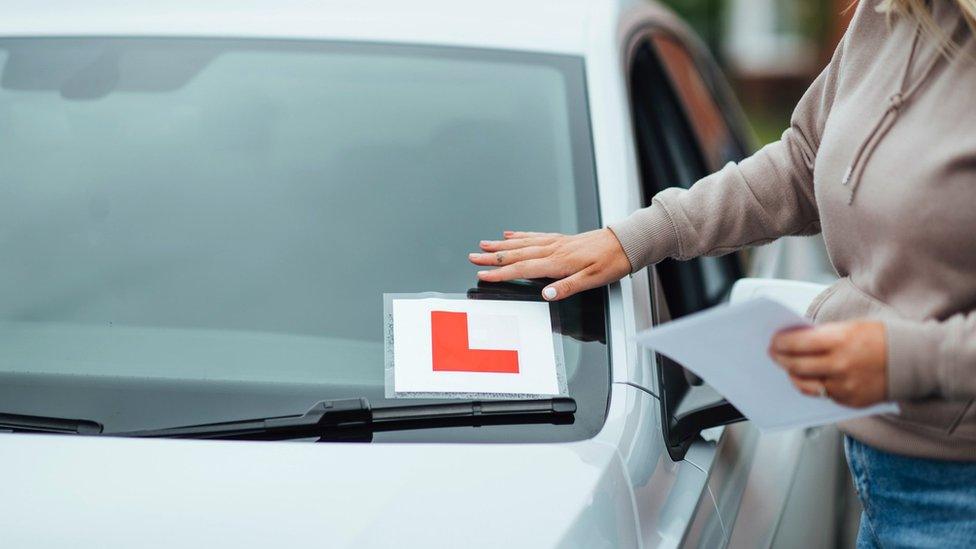Driving Tests: Why are more men passing than women?
- Published

Olivia Stevens passed her test at the sixth attempt and believes females face challenges that males do not
Every year since 2002, more men have passed their driving test in Wales than women, but why?
Last year's Driver and Vehicle Standards Agency (DVSA) data show, just three test centres had a higher female pass rate, external - Swansea, Wrexham and Bala.
Males are also statistically much more likely to be hurt or killed in crashes, external.
The DVSA said "all candidates are assessed to the same standard" and their results are "entirely dependent" on how they drive on the day.
Despite greater success in tests, young men are much more likely to be involved in crashes once they are on the road.
The AA said this was due to their "increased likelihood to take more risks on the road".
It said making road safety part of the school curriculum could "reduce casualty numbers on our roads".
Wales mirrored the rest of the UK, with an overall pass rate of 51.7% for men and 47.3% for women.
The biggest difference between the pass rates was in Pwllheli, Gwynedd, with 72.3% of male candidates successful, but just 60.1% of females.


Olivia thinks there are stigmas that affect women drivers differently to men
Olivia Stevens, 22, who passed her driving test in Cardiff last summer on her sixth attempt, believes more consideration could be given to the differences between the sexes.
"I think there is still a bit of a subconscious stigma around female drivers being bad or nervous.
"Male drivers seem to go into their test with a lot more confidence, based on my personal experience," she said.
"Also, there should be more consideration on how hormones affect driving.
"Tasks involving co-ordination and dexterity are more difficult when oestrogen is low and this can impact things like driving."
What do driving instructors say?

Karen Price says she prefers teaching males to drive
Karen Price, 61, owns KS Driving school based in Shrewsbury, but many of her students take their test in Newtown in neighbouring Powys.
She said: "If I had a choice between teaching a male or female student, I would prefer to teach the male.
"They listen and they will think about what you are saying.
"They will start to do things straight away. With a female, five hours later, you are still coping with the same problem.
"I have found that females want to go for their test before they are ready. With lads, they tend to have more practical experience in a car."

Elwyn Marfell-Jones does not see any gender differences in the learners he teaches
Elwyn Marfell-Jones, 57, owns Autolearners driving school and his students take their tests in Swansea, one of just three areas in Wales where females fared better.
"As an instructor, I treat males and females in exactly the same way. I've found it to be the winning formula," he said.
"In my experience, there is no correlation between someone's gender and how likely they are to pass their test."


Women are keeping their L plates on their cars longer than men
What are the driving test pass rates in Wales?
Latest DVSA figures for April 2021 to March 2022 show big differences across the 21 assessment centres in Wales.
The highest pass rates were in Newtown, where 76.3% of men and 75.7% of women passed.
The hardest place to pass was Wrexham, where 44.1% of men and 44.3% of women passed.
There were big differences in Aberystwyth, with 66.7% of males and 57.5% of females succeeding, and Carmarthen with pas rates of 63.2% and 54.3% for men and women.
What do road safety campaigners say?
An inquiry by the UK Parliament's Transport Committee in 2021 into the number of young people involved in crashes, external described the statistics for young males as "striking".
The report said: "Young male drivers account for 80% of young driver fatalities.
"Young male drivers are four times more likely to be killed or seriously injured on the road than drivers aged 25 years or older."
AA roads policy chief Jack Cousens said: "Younger male drivers are more likely to be involved in a crash due to their increased likelihood to take more risks on the road.
"A good way to help reduce this inclination to risk (taking) could be to include road safety as part of the National Curriculum.
"Adopting good behaviours and a sense of communal responsibility from an early age could help reduce casualty numbers on our roads."
- Published7 July 2022

- Published22 January 2022
